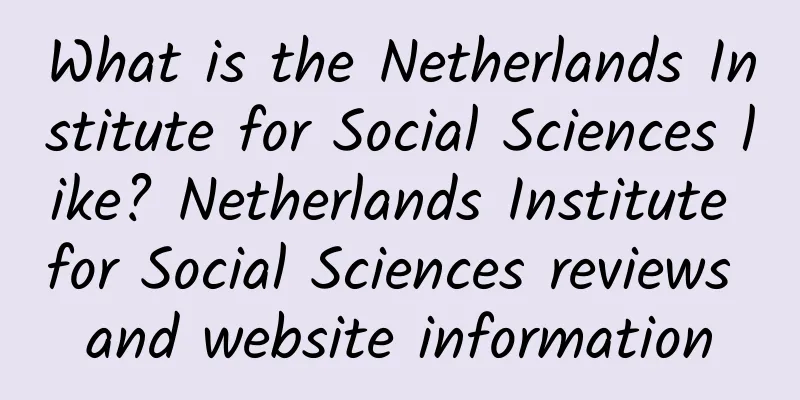What is the Netherlands Institute for Social Sciences like? Netherlands Institute for Social Sciences reviews and website information

|
What is the website of the Netherlands Institute of Social Sciences? The Netherlands Institute of Social Sciences (ISS) is an international social science higher education institute and the only social science institute in the Netherlands that is authorized to award doctoral degrees. It was founded by Dutch universities in 1952 and is dedicated to studying the development process of social and economic changes. It mainly provides master's and doctoral degree study programs, as well as short-term diploma training and postgraduate diploma training courses. Website: www.iss.nl Netherlands Institute for Social Sciences (ISS): an excellent example of international social science educationThe Institute of Social Studies (ISS) is one of the most respected higher education institutions in the field of social sciences in the world. As the only social science institute in the Netherlands that is authorized to award doctoral degrees, ISS has been committed to promoting research on the development process of social and economic change since it was jointly founded by several Dutch universities in 1952. Through its high-quality academic programs and training courses, it has trained countless influential scholars, policymakers and development practitioners on the international stage. This article will explore in depth the historical background, academic mission, degree programs, short-term training courses of the Netherlands Institute for Social Sciences, as well as its unique position and contribution in the era of globalization, aiming to provide readers with a comprehensive and detailed perspective on how this international social science education institution shapes future thought leaders and agents of social change. History: From establishment to developmentThe Netherlands Institute for Social Sciences was founded in 1952 by several top universities in the Netherlands. This period coincided with the critical stage of global economic recovery and social reconstruction after World War II, and countries had a growing demand for research on social development and economic change. ISS was born to meet the challenges of this era and became a pioneer institution focusing on development research. Over the past seven decades, ISS has experienced significant growth and evolution. From its initial single-discipline research, it has gradually expanded to a comprehensive social science school covering multiple fields such as economics, political science, sociology, and anthropology. At the same time, with the acceleration of globalization, ISS has continuously adjusted its academic direction and curriculum to better meet the needs of students from different countries and regions. Today, it has become a multicultural learning community that attracts students and scholars from all over the world. It is worth mentioning that the original intention of ISS has not changed over time - to promote social justice and equal development through scientific research and education. This firm sense of mission runs through all its academic activities, making ISS not only an academic institution, but also a social actor committed to solving global problems. Academic Mission and Core ValuesThe core mission of the Netherlands Institute for Social Sciences is to explore and understand the complex processes of social and economic change through interdisciplinary research and education. ISS firmly believes that only through in-depth analysis of global inequality and its root causes can effective solutions be found to achieve a more just and equal society. Specifically, ISS's core values include:
These core values are reflected not only in ISS’s teaching methods and curriculum design, but also in the implementation of its research projects. In this way, ISS ensures that its graduates have the skills and knowledge required to meet contemporary global challenges. Degree programs: Master's and PhD programsThe Netherlands Institute of Social Sciences offers a variety of high-level degree programs, the most prominent of which are master's and doctoral programs. These programs are known for their rigorous academic requirements, interdisciplinary teaching methods and close connection with the real world. Master's Degree ProgramISS offers master's degree programs covering a number of important areas related to social development, including but not limited to:
Each master's degree program usually lasts one or two years, depending on the course settings and personal choices. Teaching methods include lectures, seminars, case studies and field trips to ensure that students gain comprehensive knowledge and practical experience. PhD ProgramsAs the only social science institute in the Netherlands that is authorized to grant doctoral degrees, ISS's doctoral program attracts outstanding researchers from all over the world. The program focuses on cultivating students' independent research and academic innovation capabilities and encourages them to conduct in-depth exploration in specific fields. Doctoral students complete an original thesis under the guidance of their supervisors, which must cover major theoretical or practical issues in the field of social sciences. In addition, doctoral students are required to participate in academic conferences, publish research results, and receive rigorous academic training. The entire doctoral program usually takes three to five years to complete. Short-term diploma training and postgraduate diploma trainingIn addition to formal degree programmes, the Netherlands Institute for Social Sciences offers a range of short-term diploma and postgraduate diploma training courses designed to meet the learning needs of professionals and working people. Short-term diploma trainingThese training courses typically last from a few weeks to a few months and focus on specific topics such as:
Short-term diploma training is suitable for professionals who want to quickly improve specific skills or update their knowledge. The course adopts a flexible teaching method, combining theoretical learning with practical application, ensuring that participants can immediately apply what they have learned in their work. Postgraduate Diploma TrainingPostgraduate diploma training is for people who already have some work experience but want to deepen their professional knowledge. These courses are usually more systematic than short-term diploma training and may involve the comprehensive study of several related topics. For example, a postgraduate diploma training program may cover public sector reform, fiscal management and citizen participation. Whether it is short-term diploma training or postgraduate diploma training, ISS strives to provide students with practical tools and methods through these courses to help them achieve greater success in their careers. International characteristics: multicultural learning environmentThe Netherlands Institute for Social Sciences is known for its highly international learning environment. Every year, students from more than 100 countries gather here, forming a vibrant and diverse academic community. This multicultural background not only enriches the content of classroom discussions, but also provides students with valuable cross-cultural exchange opportunities. ISS actively promotes international cooperation and exchanges, and has established close cooperative relations with many well-known universities and research institutions around the world. Through exchange student programs, joint research programs, etc., ISS students and faculty members are able to access the latest academic trends and research results. In addition, ISS also attaches great importance to language diversity. Although the main teaching language is English, the school encourages students to learn other languages in order to better understand and respect different cultural traditions. This open attitude makes ISS a truly global education platform. Global Influence: A Force for Social ChangeAs a social science institute committed to solving global problems, the Netherlands Institute of Social Sciences has an impact far beyond academia. Its graduates are spread all over the world and play an important role in government agencies, international organizations, non-profit organizations and other fields. Many ISS alumni have become leaders in the field of social development in their countries or regions. They use the knowledge and skills they learned at ISS to promote policy reforms, implement development projects, and advocate social justice. For example, some alumni hold senior positions in international organizations such as the United Nations and the World Bank, while others lead key departments in their own governments. At the same time, ISS itself is also constantly advancing the research frontier, contributing wisdom to global policy dialogues by publishing research reports and holding academic conferences. In recent years, ISS has paid particular attention to emerging issues such as climate change, migration flows, and the impact of digital technology on society, and strives to provide new perspectives and solutions for research and practice in these fields. Conclusion: Looking to the futureThe Netherlands Institute for Social Sciences (ISS) is not only a shining pearl in the field of social science education in the Netherlands and even in the world, but also an important force in promoting social change and achieving sustainable development goals. Through its high-quality academic programs, diverse student groups and extensive international cooperation network, ISS has successfully cultivated generations of thought leaders and social practitioners. In the face of future challenges, ISS will continue to uphold its core values and constantly innovate teaching methods and research directions to adapt to the needs of a rapidly changing world. Whether in addressing climate change, eliminating poverty or promoting gender equality, ISS will unswervingly take the lead and contribute to building a more just and equal society. If you are passionate about social sciences and aspire to be a leader who can change the world, the Netherlands Institute for Social Sciences is an option worth considering. Visit its official website www.iss.nl to learn more about the courses, application process and other related information. |
<<: How is Aneli Asset Management? Aneli Asset Management reviews and website information
>>: How is Siena University? Siena University reviews and website information
Recommend
How to make He Xiang pork tripe soup? How to make He Shou Wu pork tripe soup
People who don't like pork belly soup think t...
The efficacy and function of shiitake mushrooms. Steps of making shiitake mushrooms.
The flavor of Shiitake mushroom is fresher than t...
Can eating Tremella help you lose weight?
Tremella fuciformis is a common fungus dish. Ever...
How is the Chinese Embassy in Kyrgyzstan? Reviews and website information of the Chinese Embassy in Kyrgyzstan
What is the website of the Chinese Embassy in Kyrg...
How is LOVE PINK? LOVE PINK review and website information
What is LOVE PINK? LOVE PINK is a famous American ...
Why can't boys eat custard apple? Who can't eat custard apple?
Sugar apple is a delicious tropical fruit, also k...
What is MetLife? MetLife reviews and website information
What is MetLife? MetLife is one of the largest lif...
How to make wine How to make wine correctly
In life, many people like to make wine at home wh...
What is the difference between gold-edged roses and ordinary roses?
It is well known that roses are the symbol of lov...
What are the benefits of eating tricolor quinoa?
Tricolor quinoa is a special delicacy introduced ...
Benefits of eating dragon fruit for pregnant women
Dragon fruit is a very good fruit. It contains a ...
How is Shilla University? Shilla University reviews and website information
What is Silla University? Silla University (Silla ...
Nutritional value of peanuts
Peanuts are a very good fruit. I heard that peanu...
Why are the leaves of Kalanchoe becoming soft?
Kalanchoe has certain requirements for soil. Alth...
How to make chestnuts
Chestnuts, commonly known as hairy chestnuts, are...









